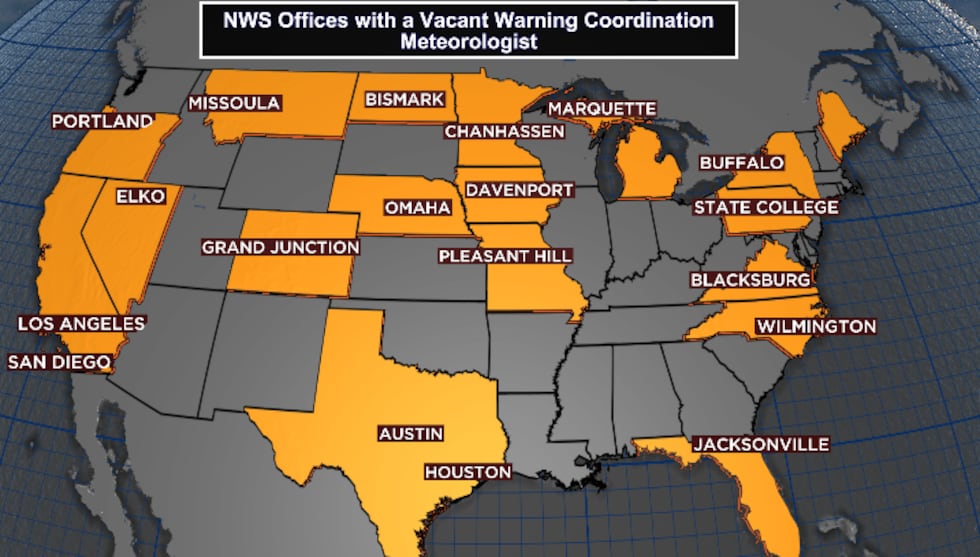Description
ATLANTA, Ga. (Atlanta News First) - The National Weather Service (NWS), a branch of the National Oceanic and Atmospheric Administration (NOAA), took a big financial hit in March.
As of today, the NWS has lost around 20% of its staff. But how will this impact our viewers across north Georgia? First Alert Meteorologist Ella Dorsey talked to two veteran meteorologists at the NWS Atlanta branch to find the answer.
PREVIOUS COVERAGE: National Weather Service employees warn cuts could impact severe weather coverage
The Atlanta branch is one of the biggest offices in the country. It covers 96 counties, roughly two-thirds of the state, and is made up of 15 meteorologists.
David Nadler, Atlanta’s warning coordination meteorologist (WCM), says that even though the team has lost three meteorologists since the beginning of the year, it is still fully equipped to keep Georgians prepared and safe.
“There’s never a time in my experience where we miss an event because we’re understaffed,” Nadler said. “If our whole area is getting hit, we’re not just going to put that on one or two people. We cut the area into sections, and four meteorologists each take a section to monitor. For example, one takes southeast of Atlanta, another takes north of I-20, another takes west of I-75.”
There are four regional NWS headquarters across the country: Eastern, Southern, Central and Western. David explained that each of these headquarters can dispatch meteorologists from all over the country to a specific area during severe weather events, ensuring that even small offices have round-the-clock coverage.
David Nadler, the warning coordination meteorologist for Atlanta’s National Weather Service office, speaks with First Alert Meteorologist Ella Dorsey.A fundamental part of each NWS office is a WCM like Nadler. This person is responsible for building relationships with government officials, schools and emergency managers so they can work together to make sure the public stays safe before and during significant weather.
Nadler said the outreach he does before significant weather plays a huge role in keeping the public safe.
“The buildup and the prep work takes more time for us sometimes than the actual event,” Nadler said. “The actual event might be, you know, six to twelve hours, but we’re spending three to five days beforehand working on messaging, briefings, emails, phone calls. It’s a lot of work.”
PREVIOUS COVERAGE: Mourning begins in Texas where more than 170 are still missing from flash floods
Across the country, there are 22 offices with a Warning Coordination Meteorologist vacancy. One of the vacancies is in the Austin, Texas, office that oversees the area along the Guadalupe River where the devastating flood occurred early on July Fourth. That office confirms it had three additional meteorologists working that night, but Kerr County has faced scrutiny about its lack of preparedness, with some residents saying they had no idea the flood was happening.

Other offices missing a Warning Coordination Meteorologist include Houston, Wilmington and Jacksonville- all hurricane-prone cities with a large population. There are also 41 other vacant high-level meteorologist positions across the country.
The NWS recently received permission to hire back 125 meteorologists and specialists, which may help fill the vacancies as we approach the peak of the hurricane season.
Steven Nelson, a recently retired meteorologist who worked at the NWS Atlanta office for 31 years, was one of the meteorologists who left in April as part of the cuts.
Nelson said he believes hiring back the 125 experts would not be enough.
“I think there was a chronic understaffing before this was going on in January,” he said. “I think it was sort of an approach to reduce agencies across the board, assuming they were fully staffed, perhaps, but that wasn’t the case in the weather service. We were already going through some challenges that meant offices weren’t fully staffed.”
Steven Nelson, a former meteorologist for Atlanta’s National Weather Service office, speaks about staffing issues at the agency.Nelson said he thinks it’s important for the NWS to be fully staffed for two main reasons.
“One is the extreme events that are unexpected,” Nelson said. “The other is just the wear and tear. The forecasters themselves are human, right? So, they have families. They have lives at home. They have a work schedule that’s unique, where they rotate shifts basically every week, and that’s assuming there’s no one who’s sick or there’s vacant positions. You add multiple vacant positions, they have to kind of juggle things around to make it work.”
The proposed 2026 budget slashes NOAA’s resources by an additional 30%, with substantial reductions in weather satellites and research and more potential staff reductions across the NWS.
Copyright 2025 WANF. All rights reserved.
News Source : https://www.walb.com/2025/07/11/how-cuts-national-weather-service-will-impact-georgians/
Other Related News
07/11/2025
ATLANTA Ga - The FBIs Atlanta field office says it has seized several websites for pirated...
07/11/2025
WALB is working to produce a video for this story In the meantime we encourage you to watc...
07/11/2025
WALB is working to produce a video for this story In the meantime we encourage you to watc...
07/11/2025
REMERTON GA WCTV - The City of Remerton has issued an emergency ordinance amid recent viol...
07/11/2025







